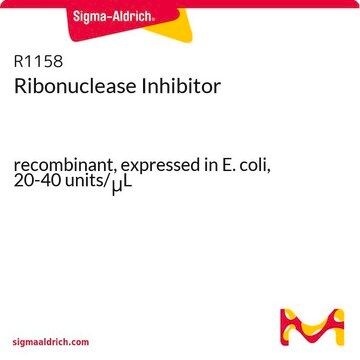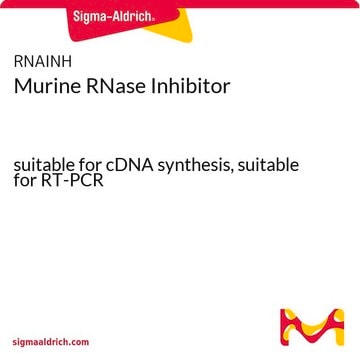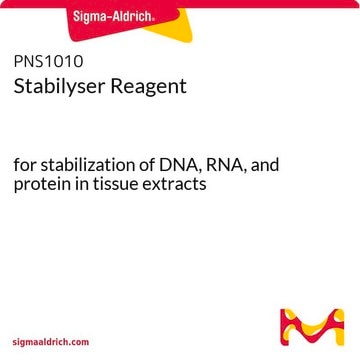R7397
ProtectRNA™ RNase Inhibitor 500× Concentrate
RNase inhibitor for in situ hybridization assays
Synonim(y):
Ribonuclease inhibitor ProtectRNA™
Zaloguj sięWyświetlanie cen organizacyjnych i kontraktowych
About This Item
Kod UNSPSC:
41106300
NACRES:
NA.52
Polecane produkty
Postać
liquid
temp. przechowywania
2-8°C
Opis ogólny
Not recommended in systems where other enzymatic activity is required.
ProtectRNA™ ribonuclease(RNase) Inhibitor inhibits most nucleic acid binding enzymes such as RNase and DNase, reverse transcriptase, some RNA and DNA polymerases, protein synthesis enzymes, and several restriction endonucleases. In contrast, ProtectRNA does not interfere with DNA and RNA hybridizations. The action ofProtectRNA as a nuclease inhibitor can be used as an advantage for in situ hybridization. ProtectRNA is useful during all steps of in situ hybridization for tissue RNA protection from RNase degradation. It is recommended to add ProtectRNA to all aqueous solutions used, from as early as the deparaffinization step until the hybridization is completed.
ProtectRNA™ ribonuclease(RNase) Inhibitor inhibits most nucleic acid binding enzymes such as RNase and DNase, reverse transcriptase, some RNA and DNA polymerases, protein synthesis enzymes, and several restriction endonucleases. In contrast, ProtectRNA does not interfere with DNA and RNA hybridizations. The action ofProtectRNA as a nuclease inhibitor can be used as an advantage for in situ hybridization. ProtectRNA is useful during all steps of in situ hybridization for tissue RNA protection from RNase degradation. It is recommended to add ProtectRNA to all aqueous solutions used, from as early as the deparaffinization step until the hybridization is completed.
Zastosowanie
ProtectRNA™ RNase Inhibitor 500× Concentrate has been used in:
- RNA extraction
- tissue sectioning and staining for laser capture microscopy
- the isolation of blood vessels from hippocampi
ProtectRNA™ RNase Inhibitor 500× Concentrate is an RNase inhibitor.
A potent inhibitor of most nucleic acid binding enzymes, and thus useful as an RNase inhibitor. Especially useful when performing in situ hybridization. If it is added to all aqueous solutions used, it eliminates the need for special glassware washing and after-wash treatments. The 500x concentrate is economical; 2 ml treats 1,000 ml of solution. Not recommended in systems where other enzymatic activity is required.
Cechy i korzyści
- The 500× concentrate is economical
- Eliminates the need for special dishwashing and“after washing” cleaning and treatments.
Ilość
2mL treats 1,000ml of solution.
Inne uwagi
This product is for R&D use only, not for drug, household, or other uses.
Informacje prawne
ProtectRNA is a trademark of Sigma-Aldrich Co. LLC
Hasło ostrzegawcze
Warning
Zwroty wskazujące rodzaj zagrożenia
Zwroty wskazujące środki ostrożności
Klasyfikacja zagrożeń
Flam. Liq. 3 - Met. Corr. 1
Kod klasy składowania
3 - Flammable liquids
Klasa zagrożenia wodnego (WGK)
WGK 2
Temperatura zapłonu (°F)
140.0 °F - closed cup
Temperatura zapłonu (°C)
60 °C - closed cup
Certyfikaty analizy (CoA)
Poszukaj Certyfikaty analizy (CoA), wpisując numer partii/serii produktów. Numery serii i partii można znaleźć na etykiecie produktu po słowach „seria” lub „partia”.
Masz już ten produkt?
Dokumenty związane z niedawno zakupionymi produktami zostały zamieszczone w Bibliotece dokumentów.
Klienci oglądali również te produkty
Potential neurotoxicity of titanium implants: Prospective, in-vivo and in-vitro study
Shahar S, et al.
Biomaterials, 276, 121039-121039 (2021)
Exposing the Three-Dimensional Biogeography and Metabolic States of Pathogens in Cystic Fibrosis Sputum via Hydrogel Embedding, Clearing, and rRNA Labeling.
DePas WH
mBio, 7(5), e00796-e00716 (2016)
Intestinal epithelial cells express immunomodulatory ISG15 during active ulcerative colitis and Crohn?s disease
?stvik AE, et al.
Journal of Crohn's & Colitis, 14(7), 920-934 (2020)
Recovery of high-quality RNA from laser capture microdissected human and rodent pancreas.
Butler AE
Journal of Histotechnology, 39(2), 59-65 (2016)
Gene expression analysis of interferon kappa in laser capture microdissected cervical epithelium.
DeCarlo CA
Analytical Biochemistry, 381(1), 59-66 (2008)
Nasz zespół naukowców ma doświadczenie we wszystkich obszarach badań, w tym w naukach przyrodniczych, materiałoznawstwie, syntezie chemicznej, chromatografii, analityce i wielu innych dziedzinach.
Skontaktuj się z zespołem ds. pomocy technicznej












